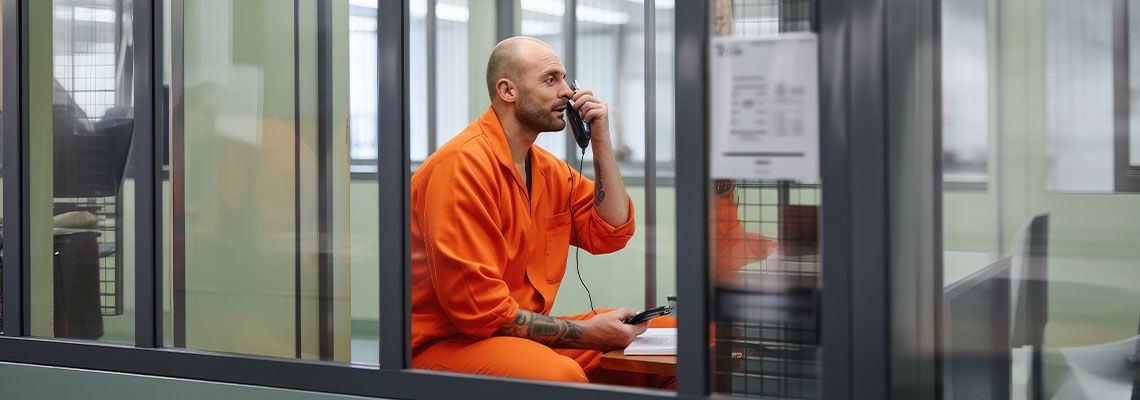Carrying a concealed weapon comes with serious responsibility. Understanding the rights and limitations tied to a concealed carry permit is critical for anyone looking to legally carry a firearm.

Are Inmate Phone Calls Private? Are They Public Record?
Anyone whose loved one is in jail or prison understands how frustrating and difficult incarceration can be for their loved one and the entire family. For many people whose freedom is restricted, visits and phone calls with loved ones are critical for their emotional and mental well-being while in jail or prison.
However, an important aspect to consider is how private these conversations between inmates and their family members are. Is anyone listening to those phone calls or can they record your conversations? If recorded, can these recordings be used against the arrestee/inmate in their criminal case? These are fundamental questions to answer to ensure that you, as a family member or friend, do not endanger your loved one when discussing various matters during visits or phone calls.
The attorneys at Balduchi Law Office, PC, understand your concerns. The law firm provides legal guidance to both people facing criminal charges or being held in custody and their family members and loved ones. With an office in Des Moines, Balduchi Law Office, PC, serves clients throughout Polk County and surrounding counties.
Inmate Phone Calls & the Expectation of Privacy
Under Iowa law, people arrested in suspension of crimes have a right to make a local phone call within a reasonable amount of time after the arrest or booking. When a person is behind bars, it is understandable that they will want to talk to their loved ones or discuss their case with an attorney. In stressful times like an arrest, many people feel the need to get the support of their loved ones or seek advice from an attorney.
However, discussing the facts of the case during phone calls while in jail or prison can hurt the arrestee or the inmate for one primary reason: these calls and visits are never truly private and confidential. There is a high likelihood that law enforcement may be monitoring these phone calls or even recording them. If the conversation is recorded and the inmate reveals incriminating information, law enforcement may be able to use the inmate’s words against him/her in their ongoing criminal case or as a basis for a new criminal case.
The only exception is when the phone call is between the inmate (arrestee) and their attorney as these conversations are subject to the attorney-client privilege. If law enforcement authorities attempt to record privileged conversations, they are violating the inmate’s constitutional right granted by the Sixth Amendment.
Can a Recorded Conversation in Jail Be Used in the Criminal Case?
When an inmate makes a phone call to a loved one or vice versa, it is fair to assume that the conversation will be monitored and recorded by law enforcement authorities. This is especially true for arrestees whose criminal case is still ongoing. Since the prosecution may still be investigating the arrestee’s case, they are likely to use any recorded conversations as evidence against the defendant. This may include recorded conversations from visits and phone calls with loved ones. Such conversations – when recorded – can be archived in a system that law enforcement officials can access for years. One of the reasons conversations between inmates and third parties are recorded is to ensure that no illegal activities are being coordinated through these calls.
Since visits and phone calls with family members – or anyone other than an attorney, for that matter – are not privileged, recorded conversations could be used as admissible evidence in the case. There is no expectation of privacy during phone calls between inmates/arrestees and their family members and friends. In fact, many jails and prisons give warnings to arrestees/inmates and their visitors that their conversations may be recorded. If the person admits guilt during such conversations – whether inadvertently or deliberately – the admission will most likely be used as evidence in their criminal case. This could even result in new charges being filed against the person who is currently behind bars.
What Is the Safest Alternative?
If an inmate has the need to discuss the facts of their case with anyone, it should be their criminal defense attorney and always in person. An in-person conversation between an inmate and their attorney offers the highest degree of privacy and is considered the safest alternative to phone calls. However, such visits should be face-to-face without any glass or other barriers between the two and with no one else in the room. Not only does it eliminate the risk of eavesdropping or conversations being recorded, but also allows the inmate to build rapport with the attorney, which can positively impact their defense.
Seek Trusted Legal Guidance
The attorneys at Balduchi Law Office, PC, are here to offer you the legal guidance and advice you need to put your mind at ease if your loved one is incarcerated or you are currently facing criminal charges or in jail/prison. The criminal defense attorneys in Des Moines, Iowa, work tirelessly to protect inmates’ rights and fight against the unlawfully recorded conversations as evidence. Contact the law firm today to schedule a free consultation.
RECENT POSTS
Divorce in Iowa and across the United States can be a challenging experience, but when children are involved, the situation becomes even more complicated.




